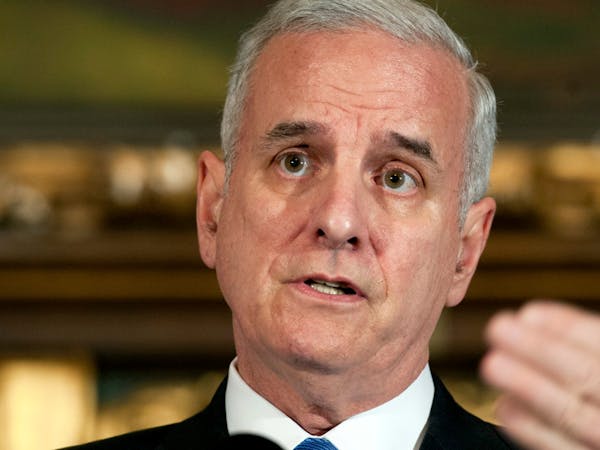DAYTON'S BUDGET
A wide range of views on 'Plan C' alternatives
I commend the Star Tribune Editorial Board for putting forth a "Plan C" alternative to Gov. Mark Dayton's budget proposal ("A better state budget omits services tax," Feb. 17). But when does taxing a minority promote fairness? Second, our state and federal governments are slowly beginning to look as cluttered as most of our garages. Over the years, laws get passed and tasks get added to the docket of things managed by our government. You proposed a $200 million cut from a $37.9 billion budget. That amounts to a whopping (drum roll, please) 0.5 percent cut in our spending. We are not reducing the footprint of the government enough. Maybe we need to come up with a "Plan D."
NICK MEYER, Stillwater
• • •
I've no problem whatsoever paying taxes to fund appropriate services. I understand taxing clothing and food. I balk somewhat at financing sports facilities. But how about an extra tax on firearms and ammunition? An expert state panel could determine where to direct the proceeds.
PAUL WAYTZ, Minneapolis
• • •
Dayton proposes a $500 tax rebate to all property owners. Nice idea. However, if property owner A pays $3,500 a year in taxes and property owner B pays $7,500 a year, they both get a $500 refund. Fair share? I don't think so. If the refund were 10 percent, then A would receive $350 and B would receive $750. They would both receive, in Dayton's words, "their fair share."
RICH OSBORN, Edina
• • •
The solution to Minnesota's budget woes isn't a higher alcohol tax.Alcohol is already one of the country's highest-taxed consumer products, and Minnesotans pay prices very similar to those paid by their neighbors across state borders. Raising the tax would put the state at an economic disadvantage and would impose an additional burden on the growing restaurant industry. The tax burden on beverage alcohol is already so high that federal, state and local governments collect more than $2 in taxes for every $1 that the industry earns in profit. The tax is also highly regressive — roughly half of all beverage alcohol in the United States is consumed in households with less than $50,000 in annual income.
SARAH LONGWELL, Washington, D.C.
The writer is managing director, American Beverage Institute
• • •
The governor should consider an alternative revenue-raising, deficit-reducing, economically sound proposal that helps to slow climate change and can be quickly implemented here in Minnesota: the carbon tax. A tax on carbon would raise revenue and encourage businesses to experiment with new ways to limit carbon emissions to cut costs. Part of the revenue could then be used to lower corporate and income taxes, spurring growth. In British Columbia, after the carbon tax was implemented, the economy grew faster than in any of the other provinces, and that province now has the lowest corporate and income taxes in Canada. As a bonus, British Columbia's carbon emissions are now 16 percent below those of other Canadian provinces. Now is the time to think outside the box on our economy and on global warming.
HANNAH JETER, Eden Prairie
• • •
I've been observing the sniping at the governor's budget proposal. It generally consists of people looking out for their self-interests. It would be more meaningful if each critic could act like a legislator. If you propose cutting a certain tax, tell how you would replace the revenue. How would you balance the budget without any of the borrowing and shifting under former Gov. Tim Pawlenty's tenure?
WAYNE SATHER, Eagan
• • •
I was planning to write a poem and submit it to Gov. Dayton for consideration as a state poem. However, I could not find enough words that rhyme with "taxes."
RICH JANSEN, Apple Valley
• • •
Dayton's proposed budget is an example of unprincipled inconsistency. He campaigned on making the rich pay more taxes. He didn't suggest an expansion in sales taxes to clothing and services which, of course, will be paid mostly by the middle class. Sadly, the Star Tribune supports his basic proposals, except for those that would affect the paper (taxes on business services). Furthermore, the paper has suggested that the governor's proposed rate on high earners is too high and would keep the state from attracting talented people.
STAN WEESE, Brooklyn Park
• • •
There's an easy solution to the problem of Minnesota retirees moving to another state to avoid paying their "fair share' of Minnesota taxes. Just do what the former Soviet Union used to do and what Cuba and North Korea do yet today: Refuse to let them leave the state. The Legislature could then pass a law that charges all tourists income taxes based on the number of days spent in our state. We would be swimming in revenue in no time, which will allow us to "invest" in myriad new projects and programs.
DOUG CLEMENS, Bloomington
• • •
Minnesotans who spend winters in Florida aren't tax cheaters (Readers Write, Feb. 18). For 23 years, my husband and I fled Minnesota's winters to bask in Florida sunshine. As soon as we declared Florida as our state of domicile, our property taxes in Minnesota increased 100 percent. Because we no longer had Minnesota state income taxes to deduct from our federal income tax, we paid a higher rate, some of which, I am sure, funneled back to Minnesota. What we paid did not equal what our Minnesota income tax assessment would have been, but we did not get off completely scot-free.
JANE M. SCANLON, Rochester, Minn.
The courage to follow the evidence on transgender care

Republicans wanted a crackdown on Israel's critics. Columbia obliged.


